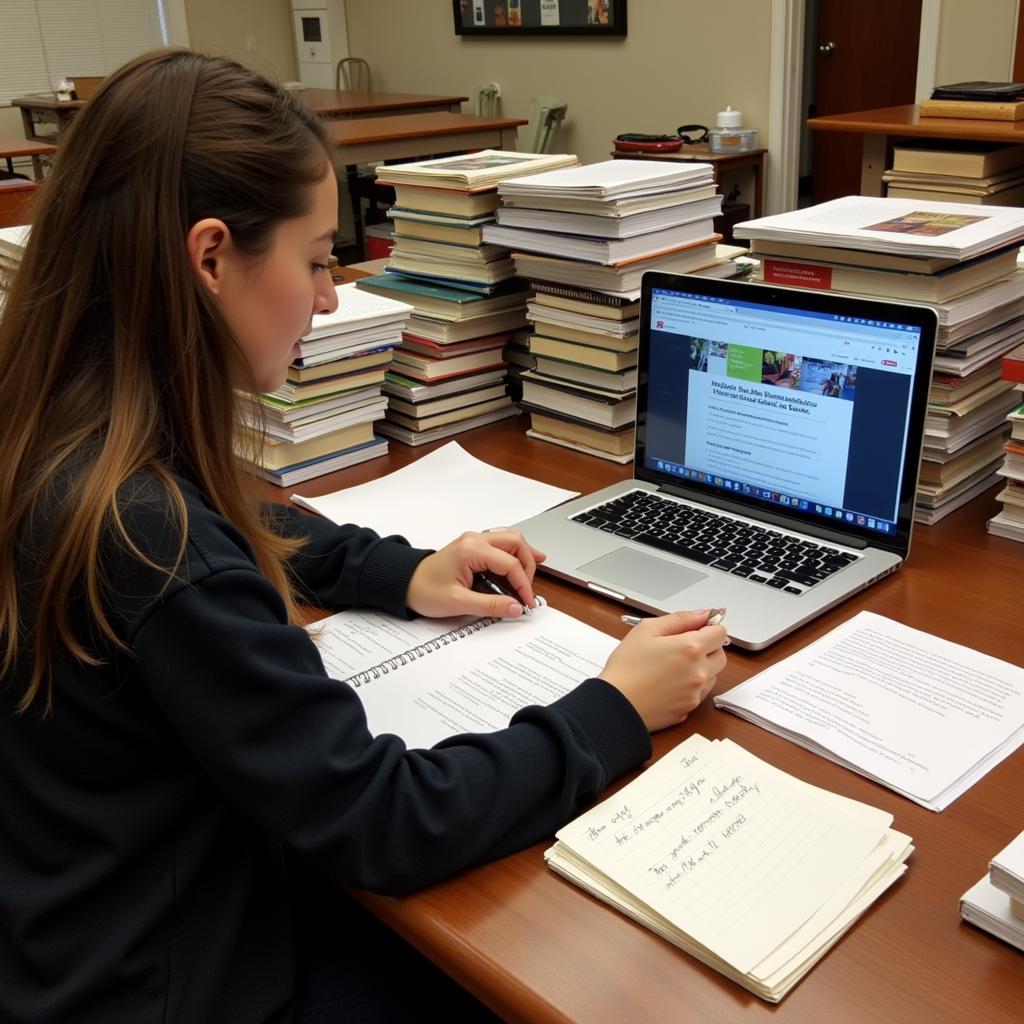Writing a history research paper can feel like traveling back in time. You’re not just recounting events but piecing together a puzzle, using evidence to craft a compelling narrative about the past. Whether you’re exploring ancient civilizations or 20th-century revolutions, this guide will equip you with the tools to write a history research paper that’s insightful, original, and worthy of top marks.
Uncovering the Past: Choosing the Right Topic
 Selecting a history research paper topic from a list
Selecting a history research paper topic from a list
The foundation of a great history research paper is a solid topic. The ideal topic should be:
- Intriguing to you: Your passion will fuel your research and make the writing process more enjoyable.
- Researchable: Ensure ample primary and secondary sources are available to support your argument.
- Manageable: Choose a topic that aligns with the scope of your assignment and available time.
Don’t be afraid to explore unconventional angles or delve into specific events within a broader historical period. A focused approach often leads to more original and insightful analysis.
Building Your Historical Framework: Research and Note-Taking
 A student surrounded by books and online resources takes notes for their history research paper.
A student surrounded by books and online resources takes notes for their history research paper.
Once you have your topic, it’s time to dive into research. Explore a variety of sources, including:
- Scholarly Books and Articles: These provide in-depth analysis and interpretations of historical events.
- Primary Sources: Letters, diaries, government documents, and artifacts offer firsthand accounts and perspectives.
- Online Databases: JSTOR, Project MUSE, and university library websites are treasure troves of academic resources.
As you gather information, develop a system for note-taking that works for you. Consider using index cards, spreadsheets, or note-taking software to organize your findings.
Constructing a Compelling Narrative: Writing Your History Research Paper
With your research complete, it’s time to weave your findings into a cohesive narrative.
Crafting a Strong Thesis Statement
Your thesis statement is your argument – it’s what you’re setting out to prove in your paper. A strong thesis statement is:
- Clear and Concise: State your argument directly and avoid vague language.
- Debatable: Present a perspective that could be argued from different angles.
- Supportable: Ensure your research provides ample evidence to back up your claims.
Structuring Your Paper
A well-structured history research paper typically follows this format:
- Introduction: Introduce your topic, provide context, and state your thesis statement.
- Body Paragraphs: Each paragraph should focus on a single supporting argument and provide evidence from your research.
- Counterarguments: Acknowledge and address opposing viewpoints to demonstrate a nuanced understanding of the topic.
- Conclusion: Summarize your main points, restate your thesis in a new light, and offer concluding thoughts or implications for further research.
Using Evidence Effectively
When presenting evidence, remember to:
- Cite Your Sources: Use footnotes, endnotes, or a bibliography to credit your sources and avoid plagiarism.
- Analyze and Interpret: Don’t just present facts; explain their significance and how they support your argument.
- Use Quotes Sparingly: Choose quotes carefully and use them to highlight key points or provide powerful voices from the past.
Polishing Your Historical Masterpiece: Revision and Editing
Before submitting your paper, take the time to revise and edit thoroughly. Consider these tips:
- Read Aloud: This helps you identify awkward phrasing and grammatical errors.
- Get Feedback: Ask a peer, professor, or writing tutor to review your paper for clarity and accuracy.
- Check Formatting: Ensure your paper follows the assigned style guide (e.g., MLA, Chicago, APA).
Writing a history research paper is a challenging yet rewarding endeavor. By choosing a compelling topic, conducting thorough research, crafting a strong argument, and presenting your findings effectively, you can produce a paper that deepens your understanding of the past and earns you top marks.
Frequently Asked Questions About Writing History Research Papers
1. How do I choose between primary and secondary sources?
Think of primary sources as firsthand accounts created during the historical period you’re researching, like diaries or photographs. Secondary sources offer interpretations of those primary sources, like scholarly books and articles. Use a balance of both to develop a comprehensive understanding of your topic.
2. How do I incorporate counterarguments into my paper?
Acknowledging opposing viewpoints strengthens your own argument by demonstrating that you’ve considered multiple perspectives. Present counterarguments fairly and respectfully, and then explain why your interpretation of the evidence is more convincing.
3. What are some common mistakes to avoid when writing a history research paper?
Avoid using overly simplistic language, making generalizations without evidence, or relying too heavily on a single source. Ensure your analysis is nuanced, well-supported, and grounded in historical context.
4. What are some resources for finding reliable historical information?
University libraries, online databases like JSTOR, and reputable historical organizations are excellent resources for credible information. Be sure to evaluate sources carefully, considering their bias and accuracy.
5. How can I make my history research paper stand out?
Explore unique angles, ask thought-provoking questions, and offer original interpretations of historical events. Don’t be afraid to challenge conventional wisdom and present your own perspective on the past.
For additional help with research paper topics, essay writing, or crafting effective emails to professors, explore these resources:
- historical topics to research
- research essay topic ideas
- research topics for 5th graders
- how to write email to professor for research
- example of mla research paper
Need further assistance in crafting a stellar history research paper? Contact us at 0904826292, email us at research@gmail.com, or visit our office at No. 31, Alley 142/7, P. Phú Viên, Bồ Đề, Long Biên, Hà Nội, Việt Nam. Our team is available 24/7 to support your research endeavors.